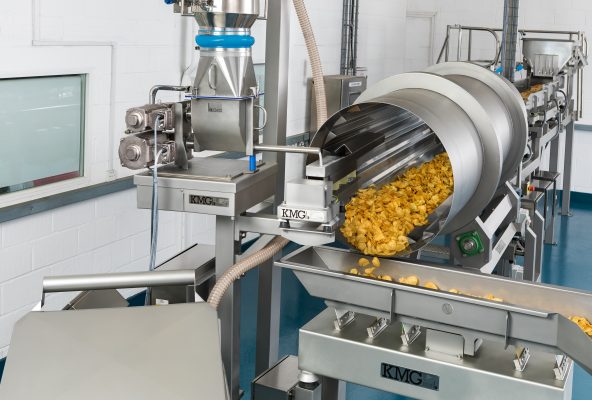As food manufacturers face increasing pressure to adopt sustainable practices, innovation in product flavouring machinery is crucial in reducing waste, improving efficiency, and lowering energy consumption. From precision dosing technology to energy-efficient designs, modern flavouring systems transform how snacks and other food products are coated while helping manufacturers meet their environmental and cost-saving goals.
The Push for Sustainability in Food Manufacturing
Sustainability in food production isn’t just about using eco-friendly ingredients—it extends to how products are processed, seasoned, and packaged. Manufacturers are looking for ways to minimise waste, reduce energy use, and optimise raw material consumption without compromising product quality. Product flavouring machinery is at the heart of this shift, ensuring efficient application of seasonings and coatings while minimising excess usage.
Key sustainability challenges in traditional flavouring systems:
- Excess seasoning waste due to uneven application
- High energy consumption from inefficient equipment
- Frequent cleaning and maintenance leading to excessive water and chemical use
- Unnecessary material waste from overuse of oils. powders or slurry coatings.
Manufacturers can address these challenges by implementing advanced flavouring technologies while improving overall production efficiency.
Precision Dosing: Reducing Waste in Seasoning Application
Precision dosing technology is one of the biggest advances in modern product flavouring machinery. Traditional seasoning systems often over-apply coatings, leading to waste and unnecessary ingredient costs.
How precision dosing helps sustainability:
- Accurate flavour application ensures every snack is evenly coated with the correct amount of seasoning.
- Real-time monitoring and adjustments prevent excess ingredient usage.
- Minimised product giveaway reduces unnecessary material loss, cutting costs and improving sustainability.
For example, gravimetric Loss in Weight systems used in on-machine seasoning (OMS) ensures that process continually applies the exact amount of seasoning required, exactly mirroring the supply of base product, preventing overuse and improving efficiency.
Energy-Efficient Flavouring Machinery
Another critical aspect of sustainable manufacturing is reducing energy consumption. Modern product flavouring machinery is being designed with:
- Ultra Low-energy drives that consume less electricity while maintaining high performance.
- Automated start/stop features operating without surge or impacting factory impedance
- Smart control systems that adjust power usage based on production demand.
In addition, new drum and conveyor designs optimise airflow and seasoning distribution, ensuring that coatings adhere to products efficiently without requiring additional processing cycles. This reduces overall energy consumption across the production line.
Water and Chemical Reduction in Cleaning Processes
Hygiene is a top priority in food production, but frequent cleaning cycles can lead to excessive water, chemical, and energy usage. Sustainable product flavouring machinery is now designed with:
- Easy-clean construction with fully welded stainless steel to reduce water and detergent consumption.
- Quick-change seasoning systems that allow for faster cleaning and flavour transitions, minimising downtime
- Automated cleaning in place (CIP) programs that use precisely measured cleaning agents to avoid overuse.
By reducing the frequency and intensity of cleaning processes, manufacturers can significantly cut down on water waste and environmental impact.
Sustainability Meets Cost Savings
Investing in sustainable flavouring technology doesn’t just benefit the environment—it also provides significant cost savings for food manufacturers.
- Lower ingredient costs – Less seasoning waste means better use of raw materials.
- Reduced energy bills – Energy-efficient systems lower overall power consumption.
- Less downtime – Automated cleaning and optimised operations improve production uptime.
- Regulatory compliance – Meeting sustainability standards can improve brand reputation and open up new market opportunities.
With rising consumer demand for sustainable food production, companies that adopt efficient, eco-friendly flavouring solutions gain a competitive advantage in the industry.
The Future of Sustainable Flavouring Technology
The future of product-flavouring machinery lies in continuous innovation, with manufacturers investing in AI-driven automation, real-time data analytics, and fully integrated smart systems. These advancements will further improve:
- Flavour accuracy and consistency across production lines.
- Ingredient traceability to track seasoning usage and reduce waste.
- Automated adjustments to optimise the seasoning application in real time.
At KMG Systems, we are committed to engineering high-performance, sustainable flavouring solutions that help food manufacturers reduce waste, cut costs, and improve operational efficiency.
Looking to upgrade to a more sustainable product flavouring system? Contact us today to discuss how our energy-efficient, precision-engineered flavouring machinery can help you achieve your sustainability goals.


